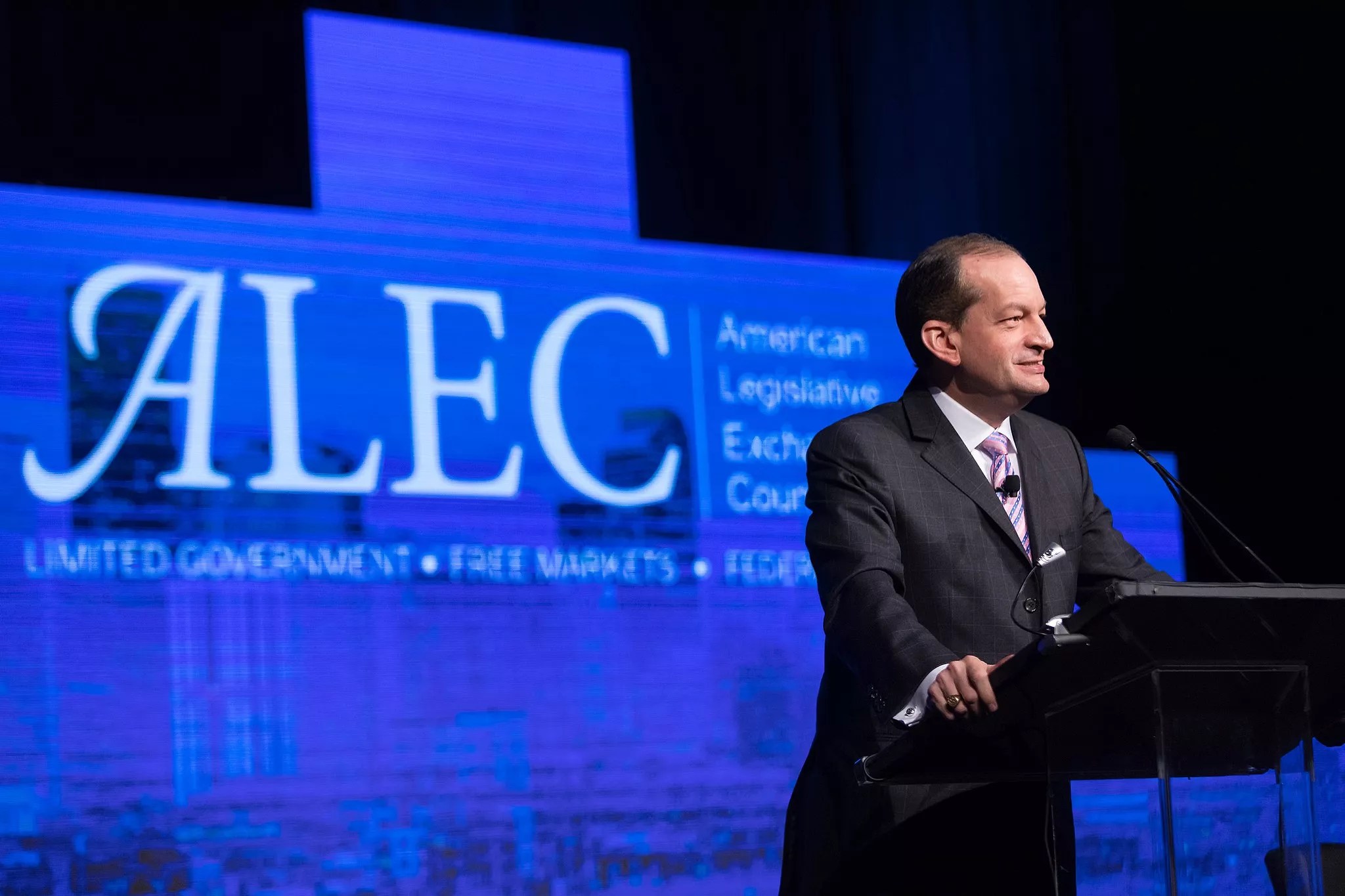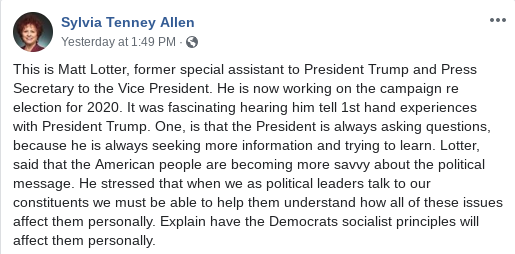

Audio By Carbonatix
UPDATE, 7:45 a.m.: This story now includes the governor and Arizona Supreme Court Justice Clint Bolick as attendees.
At least 26 Republican legislators from Arizona and Governor Doug Ducey are in Austin, Texas, this week for the 46th annual conference of the American Legislative Exchange Council.
The American Legislative Exchange Council, better known as ALEC, is a bill factory funded by industries and corporations, most notoriously the Koch Brothers. It churns out model legislation that caters to these special interests, creating templates that are ready for state legislators to copy or tweak and introduce at home.
Great seeing a lot of familiar faces at #ALECinATX! @SineKerr @VinceLeach @MichelleUgenti @TJShopeforAZ @BretRbrts @ElectDunn @Bolick4AZ pic.twitter.com/Tw350cs5wj
— Doug Ducey (@dougducey) August 16, 2019
ALEC curries favor with legislators through extravagant events, conferences, and dinners. At these gatherings, these lawmakers, who are consistently conservative Republicans, rub elbows with powerful executives and potential campaign donors.
This year’s annual conference, held at the JW Marriott in Austin, began on Wednesday and wraps up today. More than two dozen Republican state representatives and state senators from Arizona are there now.
From the House, which has 31 Republicans, 21 are currently in Texas: John Allen, Nancy Barto, Leo Biasiucci, Shawnna Bolick, Noel Campbell, Gina Cobb, Tim Dunn, John Fillmore, Mark Finchem, Gail Griffin, John Kavanagh, Anthony Kern, Jay Lawrence, Becky Nutt, Tony Rivero, Bret Roberts, T.J. Shope, Bob Thorpe, Ben Toma, Kelly Townsend, and Jeff Weninger.
From the Senate, which has 17 Republicans, at least five are: Karen Fann, Sylvia Allen, David Gowan, Sine Kerr, and Michelle Ugenti-Rita.
So was Arizona Supreme Court Justice Clint Bolick, who is married to Representative Shawnna Bolick, per a photo tweeted by the governor on Thursday evening.
Supreme Court spokesperson Aaron Nash said that the justice attended a dinner Thursday evening with his wife but did not attend any programs at the conference.
Discussing USMCA at ALEC in Austin. #federalism #freemarkets #limitedgovernment @ALEC_states pic.twitter.com/Hawgf9kQGe
— Anthony Kern (@anthonykernAZ) August 15, 2019
Attendance fees are hundreds of dollars for the full conference, depending on a person’s membership status. The lowest price of admission for elected officials and staff is $575, which doesn’t include hotel rooms and plane tickets.
In May, Representative John Allen, ALEC’s public sector chair in Arizona, urged his colleagues in the State House and Senate to book flights and hotel rooms, telling them that they wouldn’t have to foot the bill themselves.
“We’ll be offering reimbursement that covers your round-trip airfare between Phoenix and Austin along with hotel at the JW Marriott Austin’s at ALEC group rate of $199 a night from August 13-August 17th (4 nights) and your early bird registration,” Allen wrote in an email to all state representatives and senators from his House email account.
“At the very least book your hotel as early as possible as rooms are on a first come, first serve basis,” he added. Phoenix New Times obtained copies of this and other emails through a public records request.
In that email, Allen did not specify who “we” meant. Allen’s office could not confirm, and Allen did not reply to an emailed question from New Times.
Matt Specht, spokesperson for the House Republican Caucus, said that ALEC was covering the cost.
“In order to lessen any cost to taxpayers, ALEC, like other nonpartisan state legislative organizations, provides scholarships to state legislators to cover the cost of travel and lodging,” he wrote in an email. “ALEC’s annual meeting … gives Arizona legislators an opportunity to meet with their colleagues from other states to exchange ideas and discuss policies that are achieving positive results.”
Specht, who provided the list of representatives attending ALEC, said he was also at the conference, along with three other House staff members: Josh Kredit, director of policy and general counsel; Gina Kash, director of operations; and Caleb Rhodes, a policy adviser.
ALEC’s so-called scholarships don’t pay for legislative staff to attend. That comes out of the House budget, Specht said.
Mike Philipsen, spokesperson for the Republican Senate Caucus, said that the Senate did not have a list of ALEC conference attendees. “None of that goes through the Senate,” he said. “The member makes all travel arrangements through ALEC.”
Facebook postings and calls to individual offices confirmed that at least five state senators from Arizona are attending the conference. The actual number might be higher, as New Times left messages with several offices that were not returned before deadline.
Senator Sylvia Allen, who recently faced criticism for leaked, anti-immigrant remarks, posted several photos and comments to Facebook from the conference. She tagged her colleague, Senate President Karen Fann, in one post.
In the past, ALEC has paid for legislators to attend its conferences, the Investigative Center for Media and Democracy has reported. Legislators who serve as state chairmen for ALEC are expected to collaborate with corporations to raise “scholarship” funds to help pay for legislators to attend ALEC events.
The organization has been more successful influencing lawmakers in Arizona than in almost any other state, according to the Center. In its 2013 report on ALEC in Arizona, 49 of 90 legislators from 2011 to 2012 were ALEC members. These members quietly solicited donations from lobbyists and corporations to fund travel to ALEC meetings, it noted.
A spokesperson for ALEC did not reply to a request from New Times asking about how much the organization reimbursed Arizona lawmakers to cover the costs of attending its annual conference in Austin.
On March 5, ALEC hosted a dinner in Phoenix for legislators “to get to know the organization,” according to an invitation Allen sent to lawmakers. The special guest that night was Stephen Moore, a conservative economist whom President Trump later nominated to the Federal Reserve Board (Moore ended up withdrawing). Guests wined and dined at The Capital Grille, a high-end steakhouse in the Biltmore district.
For lawmakers, ALEC membership costs $100 for two years. ALEC’s corporate members pay a bit more, with annual membership starting at $12,000, an investment in their own interests that evidently pays off.

A posting from ALEC’s annual conference by Arizona State Senator Sylvia Allen on August 14, 2019
From 2010 to 2018, bills based on ALEC legislation were introduced nearly 2,900 times across all 50 states, an investigation published in April by USA Today, the Arizona Republic, and the Center for Public Integrity found.
Of those, more than 600 became law. Arizona ranked second among states for the highest number of ALEC bills introduced and passed during those years, with more than 200 bills introduced and 57 enacted. Only Mississippi had more.
That investigation also found that in 2017, the Arizona House of Representatives spent $10,000 sending six staffers to ALEC’s annual conference in Denver.
In Austin, the packed agenda this week includes meetings on every policy issue under the sun – education, pension reform, financial services, the environment, “worker freedom,” administrative law, federalism, and energy.
Attendees can join networking breakfasts and workshops like “Sunshine Showdown: The Net Metering Debate across America” and “The New Hostile Takeover: Free Markets Under Threat from ESG (come learn what that is).”
There are also training sessions on “Winning the Battle for America’s Unconscious Mind: Using Political Psychology to Improve Your Messaging” and “How to Communicate Conservative Messages Winsomely and Persuasively,” along with ice cream breaks and 6 a.m. yoga.